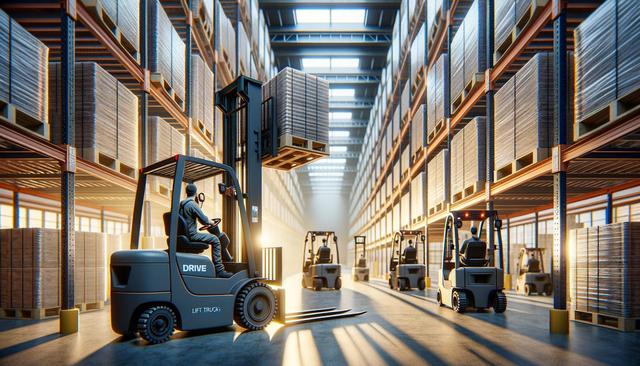The Essential Role of Forklift Operators in Logistics
In today’s fast-paced logistics and warehousing industry, forklift operators are often the unsung heroes behind efficient supply chain operations. Their role goes far beyond just moving pallets from one location to another. Forklift operators are responsible for ensuring that goods are loaded, transported, and stored safely, minimizing damage and optimizing space utilization. As businesses strive to meet tight delivery schedules and manage increasing volumes, the demand for skilled operators continues to grow. Whether you are searching for a “Forklift Nearby” or a dependable “Forklift Company Near Me,” having access to trained professionals can significantly impact operational success.
In logistics operations, time and accuracy are crucial. Forklift operators need to be precise, especially when handling fragile or high-value goods. Their ability to interpret warehouse layouts, understand loading instructions, and navigate tight spaces contributes to maintaining workflow efficiency. Moreover, their expertise in using a variety of equipment—such as the standard warehouse forklift or specialized lift trucks—adds versatility to logistics teams.
Types of Lift Trucks Used in Warehouses
The term ‘lift truck’ encompasses a wide range of material handling equipment, each designed for specific functions. In warehousing and logistics, choosing the right type of lift truck can make a significant difference in productivity and safety. Some of the most commonly used types include:
- Counterbalance Forklifts – Ideal for straightforward lifting and transporting of pallets.
- Reach Trucks – Designed for narrow aisles and high shelving systems.
- Pallet Jacks – Used for quick, manual transport of loads over short distances.
- Order Pickers – Help operators retrieve items directly from storage racks.
- Rough Terrain Forklifts – Engineered for outdoor use and uneven surfaces.
Each of these machines requires different skills and safety precautions, which is why training from a certified “Occupational Safety Company” is essential. The type of forklift also influences which certifications an operator must hold. When looking for a “Forklift Near Me,” it’s helpful to understand what types are available and which best suit your operational needs.
Safety Standards and Training for Forklift Operators
Forklift operation involves inherent risks, making safety a top priority in logistics environments. Operators must be trained to handle equipment responsibly and adhere to established safety protocols. Partnering with an “Occupational Safety Company” ensures that staff are updated on the latest safety standards and procedures. Key training areas often include:
- Proper loading and unloading techniques
- Inspection and maintenance of equipment
- Safe navigation within warehouse zones
- Understanding load capacities and stability
- Emergency procedures and hazard recognition
Ongoing training and periodic evaluations help maintain a culture of safety. Warehouses that prioritize operator education tend to experience fewer accidents, lower costs related to damaged goods, and improved employee morale. Whether you’re managing a large distribution center or a small storage facility, working with a reliable “Forklift Company Near Me” can ensure that your team is both skilled and compliant with regulations.
How Forklift Technology is Shaping Modern Warehousing
As logistics technology advances, so do the capabilities of modern forklifts. Today’s warehouse forklift models are equipped with enhanced features such as onboard diagnostics, digital control panels, and even semi-autonomous functions. These innovations not only increase productivity but also improve operator comfort and safety. Businesses searching for a “Warehouse Forklift” with advanced capabilities can now choose from a range of options tailored to specific needs.
Technology integration in lift trucks helps operators make real-time decisions, reduces fuel consumption, and minimizes downtime through predictive maintenance alerts. Some modern systems also include:
- Integrated cameras for improved visibility
- Telematics for fleet tracking and analytics
- Ergonomic designs to reduce operator fatigue
- Electric models for eco-friendly operations
These enhancements are especially useful in high-volume facilities where precision and efficiency are critical. When evaluating a “Forklift Nearby,” it’s important to consider not only availability but also technological features that align with your warehouse goals.
Choosing the Right Forklift Provider
Finding the right forklift equipment and services can be a deciding factor in achieving operational efficiency. A reputable “Forklift Company Near Me” will offer a wide selection of models, provide maintenance support, and assist with training and compliance. When evaluating providers, consider the following:
- Range of available warehouse forklift models
- Availability of parts and servicing schedules
- Operator training and certification programs
- Customer support and emergency response
- Flexibility in rental or purchase options
It’s also beneficial to choose a provider that collaborates with an “Occupational Safety Company” to ensure safety and legal compliance across all services. Whether you’re looking to expand your fleet or improve current operations, a reliable forklift partner can make a measurable difference in your logistics performance.
Conclusion: Supporting Efficient Logistics Through Qualified Forklift Operations
Forklift operators are central to the success of modern logistics and warehousing systems. From operating specialized warehouse forklifts to adhering to strict safety standards, their role requires both skill and responsibility. Businesses that invest in proper training, advanced equipment, and trusted service providers—whether through an “Occupational Safety Company” or a local “Forklift Company Near Me”—position themselves for long-term success. As supply chains grow more complex, having access to a dependable “Forklift Nearby” is not just a convenience, but a crucial component of operational resilience and efficiency.




Leave a Reply